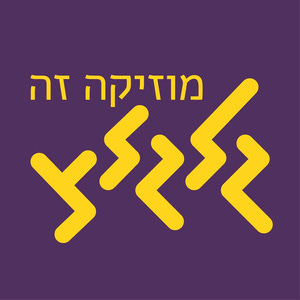Video did not entirely kill the radio star
Galgalatz, or Israeli Army Radio 2.0, is a staple of Israeli music and news.
This week’s post will explore one of Israel’s national treasures - Galgalatz radio.
The original Israeli Army Radio, Galatz - an acronym for Galei Tzahal (IDF waves - as in radio waves), was established in 1950, not long after the War of Independence in 1948.
The second generation of Galatz is called Galgalatz (‘galgal’ means ‘wheel’ in Hebrew) and the station was originally intended to specialize in traffic reports1. Galgal + galatz (galei tzahal) = Galgalatz. Oh, but it has become so much more.
Galatz began with only three or four hours a day of content for soldiers. We can compare that with today’s Galgalatz that provides 24 hours of entertainment - mostly music (both Israeli and international) and news.
One of these programs is פופטוק (Poptalk) - a podcast on Israeli pop culture, hosted by Yasmin Ishby and Achinoam Bar. It’s in Hebrew, so not too accessible to those who don’t understand the language, but worthwhile if you can understand and enjoy the topics. It could also be a good tool for training your ear.
Army Radio is so beloved that 56% of Israelis listen to Galatz and Galgalatz. There was so much content that when Galatz digitized their collection of archives, a collection of 130,000 hours of programming, the project took three years!2
A fun fact to point to the high esteem with which Israelis hold Galgalatz (and also Galatz) is that the traffic reports are so reliable that they were once used in court3.
As a throwback to the first Sababoosh podcast episode, here’s a gem regarding Hebrew:
“Galatz was the first radio station in Israel to abandon the formal, somewhat stilted Hebrew that was normally used in the media. Its entertainment programs to soldiers were the first to use colloquial Hebrew on air4.”
This more informal language certainly appealed to the younger crowd as it was more accessible than other radio stations at the time. This also opened the gates for other stations to develop and embrace this new way of doing things. To be fair, there are still stations and presenters who might use ‘higher’, more formal Hebrew, but there has been a shift to more everyday Hebrew in general. This is particularly helpful towards olim (immigrants) who are first learning the language and want to embrace the way that people actually speak day to day. My Hebrew teacher during my semester at Hebrew U always spoke about the way that people ‘speak in the shuk’ to refer to everyday Hebrew. She still taught us the ins and outs of grammar and syntax, but always remained aware of how people actually talk.
Anyways, as Galgalatz gained popularity, it prioritized higher ratings over program quality and started to lose its original high standard. It received criticism for this and started to lean into a focus on music by buying exclusive rights to play new songs and albums, both Israeli and international5.
This led to a famous slogan: “Galgalatz - before the rest”.
In another wild occurrence, April 1993 brought with it the airing of an interview that compared the Holocaust and the Armenian genocide, which drew protest from the Ministry of Foreign Affairs, and eventually led to a diplomatic incident with Israel-Turkey relations as Turkey refused to recognize what happened to the Armenians as a genocide and this interview made a case for it6.
“For many years Galei Zahal broadcasts were mainly geared toward soldiers, including music programs conveying soldiers’ greetings and various broadcasts related to the IDF. The station was unique in that it incorporated soldiers serving in the regular army into journalistic positions, including reporters, editors, producers, news broadcasters, music broadcasters, musical editors, announcers, etc.7
This points to another feature of Israeli culture - the close ties to the army. Partially due to the mandatory military service, almost everyone has military experience to draw on and feels directly connected to the army. Even if someone hasn’t served themselves, they almost certainly know people close to them who have. The Israeli military is not only a defense institution, but contributes to slang, satire, comedy, and general storytelling and literature. The fact that Galgalatz (and Galatz) are popular is unique in the way that foreign radio stations for the military would likely not receive such mainstream attention. Navy Seals in the US hosting shows highlighting hits from the 60s just doesn’t seem so appealing.
The presenters on Galgalatz are household names and many a cab in Israel are pumping out tunes and reports from this beloved station.
Further fun fact - my brother-in-law’s army service was working at Galgalatz, which I personally think is cooler than being in a secretive elite unit or highly esteemed intelligence unit.
One other feature that led to the rise in popularity of army radio:
It runs through the night.
“Following the Yom Kippur War in 1973, the station began broadcasting 24 hours a day, expanding its broadcasts to include news broadcasts and current affairs programming. For years, it was the only Israeli station that continued to broadcast throughout the night.”8
As I alluded to before, Galgalatz has become a national treasure. Many look forward to every Thursday, which sees the release of the weekly Top 10, music both from Israeli artists and those around the world. The list is a result of listener votes on the website. On the last Friday of the year, an annual list comes out, and that is, for some, more exciting than any Sylvester (the name in Europe for New Year’s Eve) party.
I can’t think of a similar phenomenon in the US. Many listen to iHeartRadio and have their favorite local news station or follow NPR, but Galgalatz is very much a household name and a highly-regarded institution of sorts.
There is a fun jingle that plays when going to a commercial break and it goes ‘Gal, Gal, Galgalatz - beeg-lawl ha-moo-zee-kah (because of the music)’. It easily gets stuck in the brain, so listen with caution. Come for the traffic reports, stay for the music.
Explore with no caution here: https://glz.co.il/גלגלצ
Song of the Week:
Netta teams up with Kfir Tsafrir (great rhyme) for this fun bopper.
נתק אותי
Nuh-talk oh-tee
Cut me off
Slang of the Week:
היידה
Hi-deh
Let’s go! Equivalent to ‘yalla’ (but this one traces its origins to Farsi)
The popularity of היידה seems to have risen in recent years.





